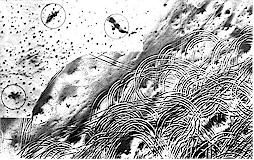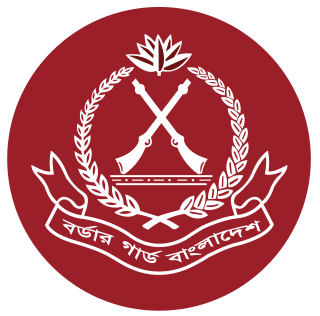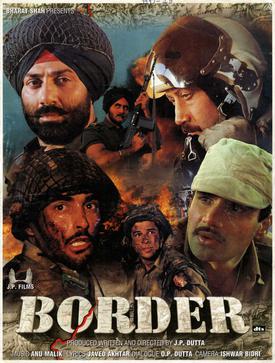
The Border Security Force (BSF) is India's border guarding organisation at its borders with Pakistan and Bangladesh. It is one of the seven Central Armed Police Forces (CAPF) of India, and was raised in the wake of the Indo-Pakistani War of 1965 "for ensuring the security of the borders of India and for related matters".

The Battle of Longewala was one of the first major engagements in the western sector during the Indo-Pakistani War of 1971, fought between assaulting Pakistani forces and Indian defenders at the Indian border post of Longewala, in the Thar Desert of Rajasthan. The battle was fought between 120 Indian soldiers accompanied by four Hunter fighter aircraft and 2,000–3,000 Pakistani soldiers accompanied by 30–40 tanks.

Law enforcement in India is imperative to keep justice and order in the nation. Indian law is enforced by a number of agencies. Unlike many federal nations, the constitution of India delegates the maintenance of law and order primarily to the states and territories.

The Border Guard Bangladesh (BGB) is a paramilitary force responsible for the border security of Bangladesh. The BGB is entrusted with the responsibility to defend the 4,427 kilometres (2,751 mi) border of Bangladesh with India and Myanmar. It was formerly known as the Bangladesh Rifles (BDR).

Lakhpat is a town in Kachchh district in the Indian state of Gujarat located at the mouth of the Kori Creek. The town is enclosed by 7km-long, 18th century fort walls.

Bangladesh–India relations are the bilateral relations between the People's Republic of Bangladesh and the Republic of India, both of which are South Asian neighbours. Diplomatic relations between the two countries formally began in 1971 with India's recognition of an independent Bangladesh. On 6 December, Bangladesh and India celebrate Friendship Day commemorating India's recognition of Bangladesh and the continued friendship between the two countries.

A border guard of a country is a national security agency that performs border security. Some of the national border guard agencies also perform coast guard and rescue service duties.

Border is a 1997 Indian Hindi-language epic war film written, produced and directed by J. P. Dutta. Set during the Indo-Pakistani War of 1971, it is an adaptation of real life events that happened during the Battle of Longewala in 1971. The film stars an ensemble cast of Sunny Deol, Jackie Shroff, Sunil Shetty, Akshaye Khanna, Sudesh Berry, Puneet Issar and Kulbhushan Kharbanda. Tabu, Raakhee, Pooja Bhatt and Sharbani Mukherjee feature in supporting roles.

The India–Pakistan, Indo–Pakistani or Pakistani-Indian border is the international boundary that separates the nations of the Republic of India and the Islamic Republic of Pakistan. At its northern end is the Line of Control, which separates Indian-administered Kashmir from Pakistani-administered Kashmir; and at its southern end is Sir Creek, a tidal estuary in the Rann of Kutch between the Indian state of Gujarat and the Pakistani province of Sindh.

The Kori Creek is a tidal creek in the Kutch region of the Indian state of Gujarat. It lies just to the west of the Great Rann of Kutch area of India. This region belonging to India is a part of the Indus River Delta, which lies across Gujarat state in India and Sindh in Pakistan.

Refugee is a 2000 Indian Hindi-language romantic drama film written and directed by J. P. Dutta. It marked the debut of both the leading actors, Abhishek Bachchan and Kareena Kapoor. The film also starred Jackie Shroff, Sunil Shetty and Anupam Kher. Refugee was an average grosser at the box office and was the fifth highest-grossing film of that year.

The 2001 Bangladesh–India border clashes were a series of armed skirmishes between India and Bangladesh in April 2001. The clashes took place between troops of the Bangladesh Rifles (BDR) and the Indian Border Security Force (BSF) on the poorly-marked international border between the two countries.

The Bangladesh–India border, known locally as the Radcliffe line (IB), is an international border running between the republics of Bangladesh and India that demarcates the eight divisions of Bangladesh and the Indian states.
The Kutch Desert Wildlife Sanctuary is situated in the Great Rann of Kutch, Kutch district, Gujarat, India. It was declared a sanctuary in February 1986. It is the largest Wildlife Sanctuary in India regarding its size.
Colonel (Retd.) Sahibzada Shahid Sarwar Azam FIEB is the current head of the Singranatore family.

The 2013 India–Pakistan border incidents was a series of armed skirmishes along the Line of Control (LoC) in the disputed Kashmir area. Starting from the mid-January 2013, they have been described as the "worst bout of fighting in the region in nearly 10 years". It began on 6 January 2013, when according to Pakistani reports Indian forces attacked a Pakistani border post, killing one soldier. Indian authorities claimed the incident as a retaliation against preceding Pakistani ceasefire violations, but denied having crossed the demarcation line. In a second skirmish on 8 January, Indian authorities said that Pakistani forces crossed the LoC, killing two Indian soldiers. The incident sparked outrage in India and harsh reactions by the Indian army and government over the news that the body of one of the soldiers had been beheaded. Pakistan denied these reports. On 15 January, a third skirmish reportedly led to the death of another Pakistani soldier.

The 2014–2015 India–Pakistan border skirmishes were a series of armed clashes and exchanges of gunfire between the Indian Border Security Force and the Pakistan Rangers: the paramilitary gendarmerie forces of both nations, responsible for patrolling the India-Pakistan border) along the Line of Control (LoC) in the disputed Kashmir region and the borders of the Punjab. Tensions began in mid-July 2014, with both countries' military officials and media reports giving different accounts of the incidents and accusing each other of initiating the hostilities. The incident sparked outrage in both countries and harsh reactions by the Indian and Pakistani militaries and the Indian and Pakistani governments.
Deaths along the Bangladesh–India border occur many times a year as result of people attempting to illegally cross into the Republic of India from Bangladesh, cross border firing and cattle smuggling. Bangladesh and India share a 4,096 kilometer border. To prevent smuggling and illegal migration from Bangladesh, the Indian Border Security Force exercises its controversial "Shoot-on-sight" policy. Under this policy, the BSF can shoot any person on site with or without cause. A large portion of the victims are cattle traders and farmers with land near the border.

The 2016–2018 India–Pakistan border skirmishes were a series of armed clashes between India and Pakistan, mostly consisting of heavy exchanges of gunfire between Indian and Pakistani forces across the de facto border, known as the Line of Control (LoC), between the two states in the disputed region of Kashmir. The skirmishes began after India claimed to have conducted surgical strikes against militant launch pads within the Pakistani-administered territory of Azad Jammu and Kashmir on 29 September 2016.














